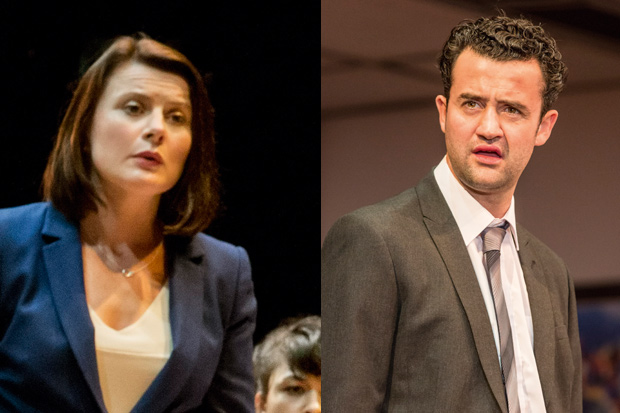High summer and it’s blockbuster time. The Donmar’s latest show is by the acclaimed Nick Payne, whose play about string theory, Constellations, wowed the West End last year. Constellations niftily incorporated its subject matter into its formal structure. What does that mean? It means the storylines multiplied like an exploding atom until an infinite number of possible endings came crashing through the space-time continuum and collided with the viewer’s patience, bundling it down a black hole. It was very clever and very boring but theatre-goers were so chuffed with themselves for understanding the physics that they kept quiet about the ‘boring’ bit.
Payne returns with a sitcom. Two dim-witted solicitors are embroiled in a ‘crash-for-cash’ scam where bungling crooks organise street prangs and claim money for injuries they haven’t sustained. It’s like Del-Boy and Rodney with the positions reversed. Andrew, the younger solicitor, is ambitious, gobby and corrupt. His older partner is homely, honest and meek. Andrew joins the conspiracy but when the case is challenged in court the shambolic crooks get ripped to shreds by a super-brainy female lawyer, played by Monica Dolan.
The show is fun but insubstantial. Here’s a sample quip. ‘I’m sweating like a dyslexic on Countdown.’ And who said it? Could be any of them. Crafted gags like that don’t emerge from character but from a writer’s idle moments in bed. Payne has probably been waiting years to slip it into a play. Legally, the script is nonsense. A civil tribunal, heard before a judge, is played out as if it were a jury trial at the Old Bailey. And the lawyers mockingly repeat what the witnesses say. Real advocates are taught never to use that histrionic ploy because it makes their cross-examinations sound like bad TV.
Towards the end there’s a showdown in which skinny Andrew (Daniel Mays) jumps on the chief criminal (Marc Wootton) and knocks the living daylights out of him. This is odd because Wootton looks at least five stone heavier than Mays. The lop-sided slug-fest takes place next to a knoll of empty cardboard boxes on to which the fighters crash-land as they clatter each other’s skulls with their fists. It’s another bad TV moment. Very hard to say what this low-brow twaddle is doing at the Donmar but I doubt if it’s doing much at the box office.
The National’s bid for blockbuster success is a rural melodrama by Pirandello. Liolà belongs to his earlier phase before he started deconstructing the theatre’s conventions and turning them into an evening’s bafflement. Richard Eyre shifts the Sicilian setting to the west of Ireland. It could be Cork, Kerry or Clare, perhaps, but it’s impossible to tell as the accents come from many counties (and there are one or two from the posher suburbs of Dublin as well).
The story takes place in a village inhabited by thousands of women and just two men: a fecund young stud and a childless old moneybags. The plot begins. Stud impregnates virgin. Moneybags agrees to pass the kid off as his own. Stud then impregnates Moneybags’s hitherto barren wife. The rival mothers-to-be lock horns with much effortful shrieking. I can’t remember what happens after that.
The meagre narrative is bulked out with dances, songs, fights, games and spur-of-the-moment pranks which harden the script’s arteries even further. The villagers do things nobody ever does except in the subsidised theatre. At one point a game of netball is improvised with a dozen wicker baskets. Just for fun, apparently. This has all the informal charm of Trooping the Colour. The cast have heartily embraced the show’s spirit of threadbare bombast and they act by flailing their elbows and jabbing their fingers as if competing for this summer’s Over-Gesticulation Medal. And the winner is Rory Keenan, in the title role, who adorns every speech with a studied twirl, or a statuesque pose, or some other intricate piece of mime in which his four limbs artfully recommunicate the tenor of his words. It must have taken him months of rehearsal in front of the bathroom mirror. I expect Richard Eyre hadn’t the heart to tell him that it’s unwise to perform emotional dialogue while impersonating Kenny Everett doing origami.
Anthony Ward’s set is a bevy of ill-harmonised gestures. The action takes place on a tilted wooden square like a factory pallet. Behind this stands a wall of cracked beige wattle. Overhead, the blazing Irish-Sicilian sky is suggested by an IMAX screen projecting an azure blankness with a single cloud but no sun. In the far corner sits an olive tree with leprosy. The emaciated branches are decorated with strings of 60-watt light bulbs that trail out over the auditorium and make the Lyttelton look like a bookies at Christmas. As I left, I heard an NT stalwart summing up the experience to a fellow fun-seeker: ‘Sorry about that. I couldn’t stop yawning.’







Comments